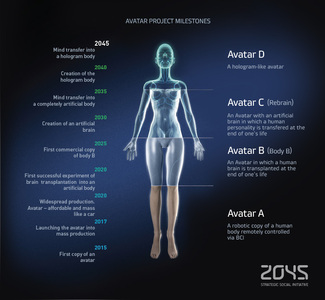/ Immortality Corporation Vision
Dear friends,
Let me introduce you the Immortality Corporation work schedule.
The schedule is based on the analysis of the already existing research programs of "2045" Initiative Group Members, as well as other scientific communities from Russia and abroad.
Artificial Body Research and Development will be divided into several tracks, to be pursued simultaneously.
The four tracks and their suggested deadlines are optimistic but feasible. This is our program for the next 35 years, and we will do our best to complete it.
The fourth development track seems the most futuristic one. It’s intent is to create a holographic body. Indeed, its creation is going to be the most complicated task, but at the same time could be the most thrilling problem in the whole of human evolution. Perhaps it is the ‘radiant mankind’ Konstantin Tsiolkovsky wrote about.
We are in the process of creating focus groups of experts. Along with these teams, we will prepare goal statements and research programs schedules.
We invite interested specialists to contact us and join the discussion. We welcome your contribution.
Dmitry ITSKOV
/ experts
- Professor at the University of Southern Maine, co-chairman of GF2045
 Barry
Barry
Rodrigue"While innovation is often presented as a technological process, it also needs to be applied everywhere and to everything. We need innovation in human affairs, from family relations to business affairs. Innovation has to address both ecological balance of species and destruction of inorganic habitats. Alternatives must be found for warfare and the arms industry. In short, innovation is a process that applies to all existence..."
- Ph.D. in Biology, Head of the Neurophysiology and Neural Interfaces Lab at the Russian State University Biology Department (MGU)
 Professor Alexander Y.
Professor Alexander Y.
KAPLAN‘By the time sustaining a brain artificially becomes possible, bio-robots will have been perfected to the point of looking like a decent human body...’
- Ph.D. in Medicine, Head of the Cells and Tissues Growth Laboratory of Theoretical and Experimental Biophysics (Russian Academy of Sciences)
 Professor Boris K.
Professor Boris K.
GAVRILYUK“For skin on a cyborg, you simply need to create a nutrition system. And basically . . . we are not really complex in design! There are only a few systems: the circulatory system carries oxygen and nutrients; the excretory system extirpates the waste. The rest is end-effectors. To begin we can create a very simple living organism—then, later, more complex systems. . . .”
- Russian futurologist writer, journalist
 Maxim
Maxim
Kalashnikov"This is something that nobody in the world could pass up. Creation of super- and posthuman, I believe, is a gaining of new strength while saving from degeneration and extinction, . This could potentially make Russia the world leader…’
- Ph.D. in Biology, Head of the Lipid Metabolism Laboratory at the Russian Institute of Gerontological Research and Development
 Elena V.
Elena V.
TERIOSHINA‘There is nothing to be afraid of. The project of creating a carrier of an immortal brain is of extreme importance. Nature definitely creates talented, brilliant, genius people – but they are mortal. Mankind creates books and imparts knowledge to descendants. But imagine a genius working eternally!’
- Ph.D. in Physical and Mathematical Sciences, Senior Researcher of the Heat-Resistant Thermoplastics Laboratory at ISPM (Russian Academy of Sciences), creator of nanosensor neurologic ‘Electronic nose’ system
 Mikhail Y.
Mikhail Y.
YABLOKOV‘When creating an artificial human, we need to add an emotional trend to the predominant robotics one. It’s an all-inclusive idea, and it’s in the air...’
- President of Neyrobotiks
 Vladimir A.
Vladimir A.
KONYSHEV‘The transfer of the brain into an artificial body, more enduring, more perfect, is the only way the human race to stay on Earth...’
- Ph.D. in Physical and Mathematical Sciences, Senior Researcher of the V.I.Il`ichev Pacific Oceanological Institute (Russian Academy of Sciences), composer, philosopher
 Viktor Yurievich
Viktor Yurievich
Argonov“I think that before initiating a radical cyborgization of the brain, you have to find the neural correlate of consciousness. Does it have a physical or purely informational nature in the form of neurosignals? Is there a group of neurons that is directly responsible for consciousness? Or perhaps consciousness is produced by still smaller elements within neurons. . . .”
- Researcher, science debater, futurist, transhumanist, and author
 Anders
Anders
Sandberg"... I certainly think that practical benefits of being able to live for ever, if I transmit myself digitally, I will be able to run on bodies which are not biological or enhanced biological and be able to backup copies in case, if something goes wrong, would be enormous. So, I think, that in the future I am hoping to be software..."
- Correspondent member of RAS, professor of the Moscow State University, head of the laboratory “Psychology of communications and psychosemantics” (MSU)
 Viktor F.
Viktor F.
Petrenko"I think that as a working hypothesis, it is possible that forms of contacts with highly advanced civilizations are possible as a result of this profound meditation..."
- Researcher, fiction and alternate history theorist. Is a literary critic and political essayist, sociologist, socionics specialist and military historian
 Sergey
Sergey
Pereslegin"Project 2045 also requires enormous engineering support. And I would claim that both for Russia and for the entire world, the only possibility of overcoming the phase barrier is not to solve biological tasks, not biotechnology, but to solve the task for maintaining engineering for the critical period of 20 years".
- Head of the Space Technology and Telecommunications Cluster at the Skolkovo
 Sergey
Sergey
Jukov"I am absolutely convinced that the movement “2045’ happened exactly at the right time and the right place as I believe in the great future for Russia, in her success after temporary difficulties".
- Ph.D. in Biology, Inventor of the "Bioartificial liver" device
 Professor Vyacheslav Y.
Professor Vyacheslav Y.
RYABININ







 LinkedIn
LinkedIn
 LiveJournal
LiveJournal
 Google
Google
 Twitter
Twitter
 Facebook
Facebook
 Я.ру
Я.ру
 ВКонтакте
ВКонтакте
 Mail.ru
Mail.ru